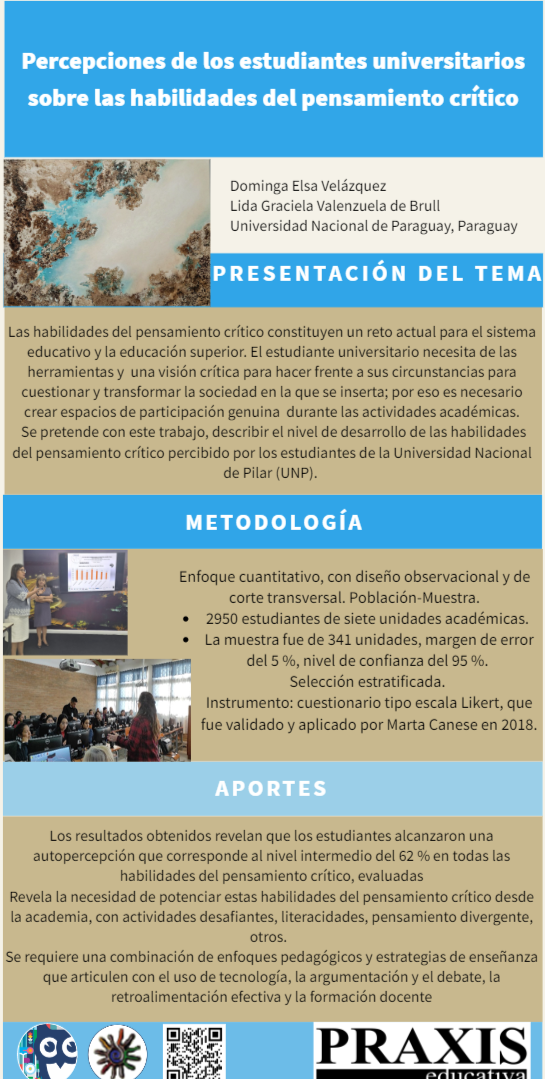Perceptions of university students on critical thinking skills
DOI:
https://doi.org/10.19137/praxiseducativa-2024-280310Keywords:
critical thinking, reading comprehension, analysis, intellectual empathy, evaluation.Abstract
This research aims to describe the level of development of critical thinking skills perceived by students at the National University of Pilar (UNP). The approach was quantitative, with an observational and cross-sectional design. The population included 2950 students from seven academic units. The sample was 341 units, determined with a margin of error of 5 %, a confidence level of 95 %, stratified and randomly selected by telephone dialing. We use the Google questionnaire until we complete the required amount for each stratum. We apply the instrument validated by Canese (2020) of critical thinking skills. We found that the students reached an intermediate level (62 %) in all skills, the level degrading according to the complexity of the thought process required. This reveals the need to enhance these critical thinking skills from the academy.
Downloads
References
Camacho Tovar, G. L. C., Jordán Yépez, A. E. y Contreras, G. A. (2015). En línea: Metodología de la investigación educacional. Académica Universitaria. file:///C:/Users/hplap/Downloads/Libro%20Angela%20Elizabeth%20Jord%C3%A1n%20Y%C3%A9pez%202015%20Metodolog%C3%ADa%20de%20la%20investigaci%C3%B3n%20educacional.pdf.
Canese, I. (2020). Percepción del desarrollo de las habilidades del pensamiento crítico en la Universidad Nacional de Asunción. Paraguay. Perfiles educativos, XLII(169), 21-35. https://doi.org/10.22201/iisue.24486167e.2020.169.59295
Cangalaya, L. (2020). Habilidades del pensamiento crítico en estudiantes. Desde el Sur. 12(1), 141-153. https://doi.org/ 10.21142/DES-1201-2020-0009.
Carlino, P. (2013). Alfabetización académica diez años después. Revista Mexicana de investigación educativa, 18(57), 355-381. https://www.redalyc.org/pdf/140/14025774003.pdf
Cátedra UNESCO. (2015). Cátedra UNESCO. Lectura y escritura: continuidades, ruptura y reconstrucciones. En N. T. Álvarez Martínez y C. Muse (Eds.), Leer en la Universidad, una cuestión crítica, 3, 63-70. http://rdu.unc.edu.ar.
Curiche, D. (2015). Desarrollo de habilidades del pensamiento crítico por medio de aprendizaje colaborativo medido por computador en alumnos del tercer año medio en la asignatura de filosofía [Tesis para optar al grado de magíster en Educación]. https://goo.su/OAj2yLU
Flores Guerrero, D. (2016). La importancia y el impacto de la lectura, redacción y pensamiento crítico en la Educación Superior. Zona próxima, (24), 128-135. https://www.redalyc.org/pdf/853/85346806010.pdf
Gómez, D. A. y De La Herrán Gascón, A. (2018). Desarrollo del pensamiento crítico en estudiantes de Educación Secundaria: Diseño, aplicación y evaluación de un programa educativo. Profesorado, Revista de Currículum y Formación del Profesorado, 22(4), 269-285. https://doi.org/10.30827/profesorado.v22i4.8416
Gómez-López, J. R. y Reyes-Lizárraga, J. O. (2015). Análisis de uso de la Plataforma moodle en estudiantes universitarios. RITI Journal, 3(5), 24-28. https://dialnet.unirioja.es/servlet/articulo?codigo=7242800
Hernández Sampieri, R., Fernández Collado, C. y Baptista Lucio, P. (2014). Metodología de la Investigación. Mc Graw Hill. https://goo.su/GvNzkT3.
Lillis, T. (2021). El enfoque de literacidades académicas: Sostener un espacio crítico para explorar la participación en la academia. Enunciación, 26, 55-67. https://doi.org/10.14483/22486798.16987
Operatti, R. (2023). Sobre leer y aprender a leer. Unesdoc. Biblioteca digital, 1-6. https://doi.org/https://unesdoc.unesco.org/ark:/48223/pf0000386632.
Ortiz Arellano, E. (2013). Epistemología de la Investigación Cuantitativa y Cualitativa: Paradigmas y Objetivos. Revista de Claseshistoria, 408, 1-23. file:///C:/Users/hplap/Downloads/Dialnet-EpistemologiaDeLaInvestigacionCuantitativaYCualita-5174556.pdf
Qualtrics.XM. Obtenido de https://www.qualtrics.com/es-la/gestion-de-la-experiencia/investigacion/calcular-tomano-muestra/
Rivadeneira, E. M. J., Torres, T. Y. V., Jaramillo, N. I. A., Ayovi, D. J. Q. y Cubi, J. G. A. (2023). Estrategias efectivas para fomentar el Pensamiento Crítico en el Aula. Ciencia Latina Revista Científica Multidisciplinar, 7(2), 6148-6162. https://doi.org/10.37811/cl_rcm.v7i2.5780
Rojas García, I. (2016). Enseñar a leer y escribir en las disciplinas. Estado de la cuestión en las universidades colombianas. Folios, 45(1), 29-49. https://doi.org/10.17227/01234870.45folios29.49
Sanz de Acedo Lizarraga, M. L. (2016). Competencias cognitivas en Educación Superior. Narcea, SA de ediciones. https://narceaediciones.es/es/Madrid
Ubal, M., Tambasco, P., Martínez, S. y García, M. (2023). El impacto de la Inteligencia Artificial en la educación. Riesgos y potencialidaddes de la IA en el aula. RiiTERevista interuniversitaria de investigación en tecnología educativa, (15), 41-57. https://doi.org/https://doi.org/10.6018/riite.584501
Velázquez, D. E. (2019). Comprensión Lectora de los estudiantes del primer curso, Carrera Ingeniería Agropecuaria de la UNP. Ciencia Latina Revista Científica Multidisciplinar, 3(1), 287-302. https://doi.org/10.37811/cl_rcm.v3i1.2
Velázquez, D. E. (2019). Procesos cognitivos en estudiantes del primer año de la carrera Ingeniería Agropecuaria de la Facultad de Ciencias Agropecuarias y Desarrollo Rural de la Universidad Nacional de Pilar. Brazilian Journal of Development, 5(2), 1654-1667. https://doi.org/10.34117/bjdv5n2-1152

Published
Issue
Section
License
Copyright (c) 2024 Dominga Elsa Velázquez, Lida Graciela Valenzuela

This work is licensed under a Creative Commons Attribution-NonCommercial-ShareAlike 4.0 International License.
Copyright Notice
Editorial Committee Educational Praxis Magazine:
I hereby declare that I am the author of the article titled (article name), that it is original and my own and that it was not previously published in any other format or medium. I declare to know that the magazine will not charge me any type of fee under any circumstances, nor will I receive any type of monetary compensation If it were accepted for publication in Educational Praxis, I authorize the aforementioned magazine to publish it digitally and to advertise it on its social networks.
If the work is published, I adhere to the Creative Commons license called "Attribution - Non-Commercial Share Alike CC BY-NC-SA", through which it is allowed to copy, reproduce, distribute, publicly communicate the work and generate derivative works, as long as when the original author is cited and acknowledged. This license has been used since September 2018. In 2016 CC BY NC ND 4.0 was adhered to; and in the years 2017 and 2018 (January-August) CC BY NC 4.0.
This CC BY-NC-SA Share Alike license does not, however, permit commercial use of the work. As an author, the journal may establish additional agreements for the non-exclusive distribution of the version of the work published in the journal, it allows me to self-archive the published articles, in their post-print version, in institutional, thematic repositories, personal web pages or any other relevant use. with the recognition of having been first published in this journal.
Educational Praxis adheres to DORA (Declaration on Research Assessment) signed in San Francisco, California, on December 16, 2012, and to the Declaration of Mexico (Joint Declaration LATINDEX - REDALYC - CLACSO - IBICT).














_(1)2.png)


3.png)











_(2).png)






2.jpg)









